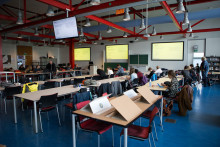The current glut of temporary contracts is creating uncertainty and stress among researchers, Minister Van Engelshoven wrote in a letter to the Dutch House of Representatives on Monday. She is calling for agreements with the Association of Universities in the Netherlands (VSNU) to reduce the number of academic staff without fixed contracts.
At the same time, she cautioned that doing so could result in ‘having to make tough choices about which young researchers can stay at the university and whose talents are better suited to serving the rest of the labour market’. ‘It is vitally important’, she continues, ‘for us to wake up to the fact that most doctoral candidates are being educated to enter the wider job market and not for careers in academia’.
Flood
The minister’s Letter to Parliament came in response to a set of new measures aimed at taking some pressure off the university system. These were presented back in January by the Dutch Research Council (NWO), which awards funding, and the Association of Universities in the Netherlands to stem what has become a flood of research grant applications. Now, there is a plan.
Among the measures proposed by the Dutch Research Council and the Association of Universities in the Netherlands is lifting some deadlines so applicants have a longer submission window. Researchers whose proposals are still deemed too weak would subsequently be barred from submitting another proposal for a certain period. The two organisations want the number of publications to be given less weight in grant assessments and propose to exempt young researchers from applying for grants.
Minister Van Engelshoven fully supports the plan, she has now informed the House of Representatives. ‘It demonstrates the Dutch academic community’s excellent ability to join forces and take on the big problems in the sector.’ She further affirms that some issues can only be solved with more money. She plans to follow up on this point in mid-April.
Incompetence
Opinions about the joint NWO-VSNU proposal presented earlier this year were split. In an interview with de Volkskrant, Belle Derks, chair of The Young Academy, said she too expected the plans would lighten the application load. Now that the new ideas have been crystallised, however, and endorsed by the minister, Derks wants to consult with the rest of the board later this month on a response.
Remco Breuker, a professor at Leiden and one of the faces of WOinActie – a movement that defends the interests of university education and the link with scientific research – called the measures a ‘proof of incompetence’ on the part of the initiators. ‘I think we should pull the plug on grants and drastically downscale the NWO.’






